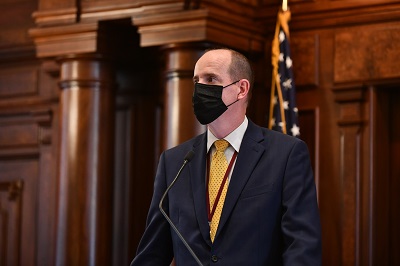 SPRINGFIELD – State Senator Bill Cunningham, who has been deeply involved in negotiations on a piece of legislation meant to spark Illinois’ renewable energy sector and preserve and create tens of thousands of jobs, praised the legislation’s Senate passage.
SPRINGFIELD – State Senator Bill Cunningham, who has been deeply involved in negotiations on a piece of legislation meant to spark Illinois’ renewable energy sector and preserve and create tens of thousands of jobs, praised the legislation’s Senate passage.
“This plan would make Illinois a national leader in fighting climate change,” said Cunningham, a Democrat who represents portions of Chicago and the southwest suburbs. “It also will help transition our energy workforce from fossil fuels to renewables earlier than any other state, giving those workers a distinct advantage in training and experience.”
The legislation, Senate Bill 18, sets an ambitious goal of transitioning Illinois’ electric generation to 100% renewable energy by 2050 and 50% renewable energy by 2040. It creates a firm schedule for closing coal, oil, and gas-based power plants, which are a major contributor to global warming. In order to reach these goals, it more than doubles the state’s budget for renewable energy, creates new workforce training programs, and allows for the construction of two renewable energy transmission lines.
In the short term, it provides funding to keep Illinois’ nuclear plants open, helping preserve thousands of jobs and ensuring that they aren’t replaced with fossil fuel-burning plants that would contribute to climate change.
To further fight global warming and create good-paying jobs, the measure also includes incentives to expand the adoption of electric vehicles and improve energy efficiency in homes. For example, it expands the low-income weatherization program and allows customers to finance energy efficiency projects through their utility providers.
“There’s no getting around the fact that the world is going to become fossil fuel free,” Cunningham said. “They’re a limited resource and by burning them, we’re making parts of our planet unlivable. By investing and planning, we can help protect our children and grandchildren’s futures while creating good-paying jobs now.”
To protect consumers and address the criminal activity of ComEd, the measure would also formally empower the Illinois Commerce Commission to investigate any utility company convicted of criminal activity to determine if it misused customer money. If the ICC finds that ComEd has squandered its customers’ money for illegal activities, it would be able to enforce penalties that include forcing the troubled company to return money to its customers. The measure also creates a state utility watchdog to oversee utility companies’ own internal controls and prohibits charging low-income customers late fees.
The legislation now goes to the House for further consideration.


